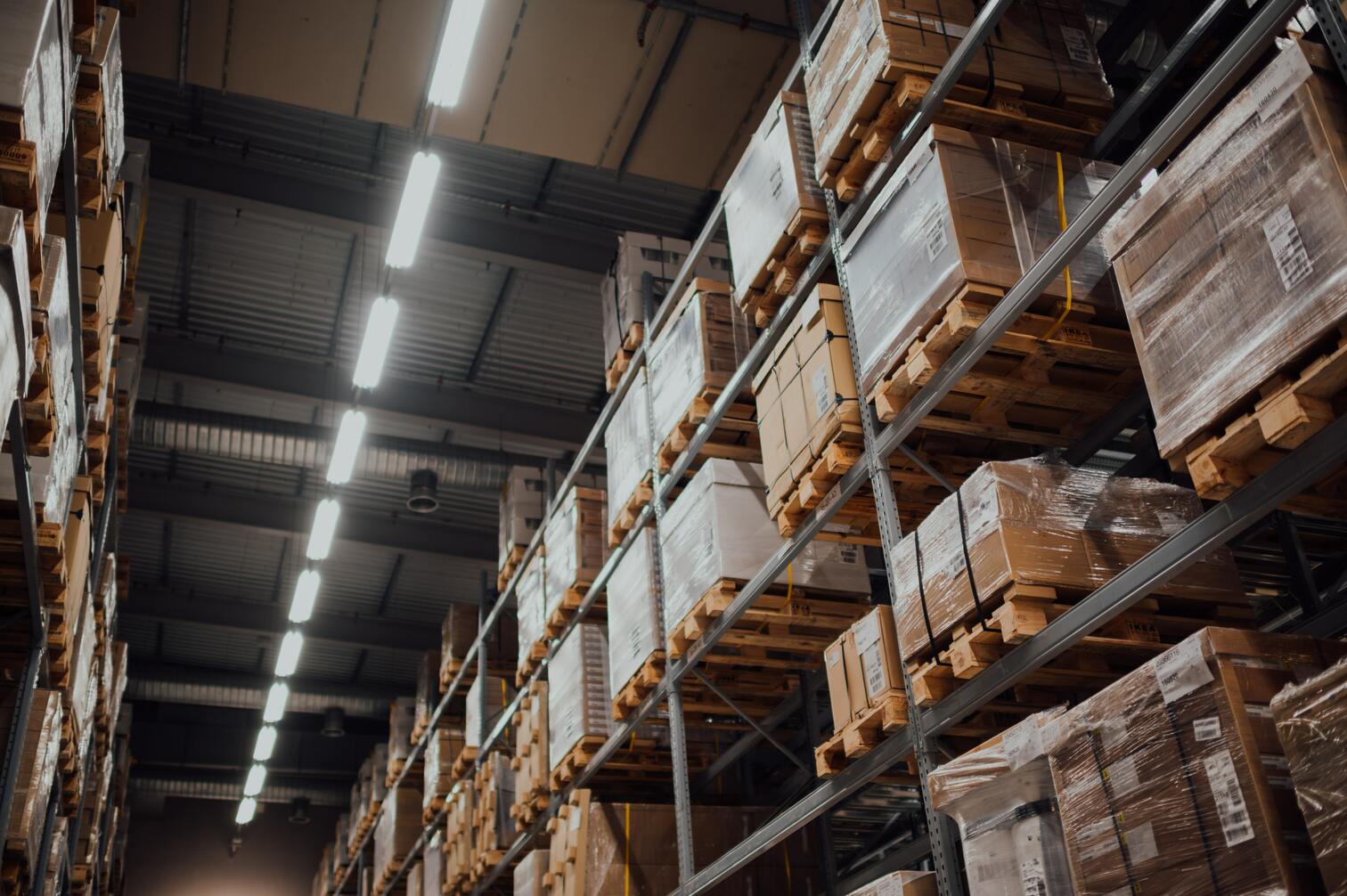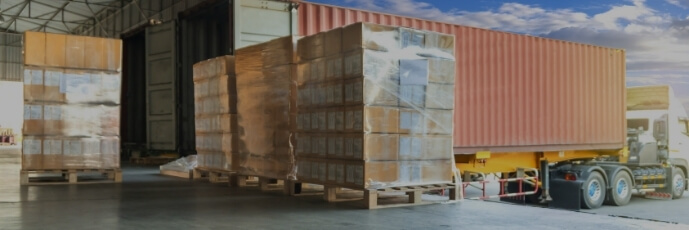By Jerome Dingeldein
December 8, 2020 • 15 min read

Shipping pallets – seems like a simple task, right?
By looking at it, you could almost say that it looks like a glorified taxi service for goods. Arranging a pallet shipment can actually be quite a hassle.
Let us talk numbers!
Did you know that at this point, approximately 2.4 million people work in the road freight sector in the European Union and there are 6.6 million trucks driving on European roads?
That number will only increase in the coming years due to the fact that the global trade environment is expected to grow in financial volume. Experts estimate that international trade will increase in market value to 27 trillion US dollars by 2030.
A big part of the products that are shipped daily are commodity products and other necessities, for instance food, clothing, electronics, and countless others. Most of the time, these types of goods are shipped via pallets since this is the most efficient way to transport them. This is because pallets are easy to load, stable, safe and of course, cheap!

Let us agree on the point that due to the sheer size of the industry, there are a lot of external factors that come into play.
Supply chains are becoming more complex, markets more dynamic and companies have to adjust to Just-In-Time (JIT) deliveries, therefore it only makes sense to use trucks as they seem to be the best solution for the problem.
Of course, it speaks for itself that not every single company can have its own trucks to deliver the goods. This is mostly done through outsourcing the transport to external forwarders.
To give you a clearer idea of the in-depth dynamics and activities involved, we will use an example. The company you work for needs to ship 10 pallets and therefore needs to find a suitable and trustworthy carrier.
This would have been an easier job in the past, as now, year by year, the number of carriers is decreasing. Lack of interest in the profession and aging of the current truck drivers are only a few among the causes of this shortage.
Obviously, this poses a problem since the actual demand for products is not decreasing. Managers need to consider that shipping a product might become more expensive and difficult in the nearby future.
Not only the shortage of carriers, but also the rising fuel prices are naturally leading towards higher transportation costs.
However, as the logistical sector keeps on growing, more and more trucks have to be sent on the road. The more trucks are driving on the road, the worse traffic congestion gets, a logical conclusion, right?
Apart from affecting performance and customer satisfaction, delays also increase transportation costs. To give you an idea, the cost of a 1 hour delay is around €50 to €60 per vehicle. You all know the saying … Time is money!
Let’s continue with our story, you have managed to find a carrier and prepared the pallets for transport. Great!
Yet, what happens during transportation? What if your goods get damaged? What if your shipment experiences a delay? Will these cause other problems along the way? What if you are not aware of these circumstances and you will have to adapt quickly or even worse, imagine that your goods get stolen!
These are all common issues that emphasize how important supply chain transparency and transportation safety really are. Perhaps you have found a competent carrier, nevertheless, situations may occur in which you will need an emergency carrier.
What will you choose? Uncertainty or failed delivery
This brings us to the next challenge.
As sometimes many external parties are involved in pallet shipping, it is of the great importance to keep track of the people involved and also of their respective responsibilities in the process. The slightest occurrence of miscommunication can cause major problems that can in their turn affect the whole supply chain.
In the end, every mistake leads to unnecessary costs, which could be easily avoided. What is also not helping, is that the logistical industry is still being operated in the traditional way: phone calls, e-mails, face-to-face communication.
Yet, what if you need to ship pallets the same day as fast as possible? Do you have the time to call every single number written down in your notebook to find a free carrier?
If we continue with our journey in the shipping process, then we have now arrived at the pick-up point. The only thing left to do is to sign the proof of delivery (POD) document.
Right! Documentation plays a huge role in pallet shipping. There are lots of different contracts and documents that need to be signed and this takes time. As mentioned earlier, logistics is a traditional industry. This does not only affect the communication but also the way liability is handled.
Literally, it’s tons and tons of paperwork! Manually printing contracts, getting signatures, sending out copies and checking if you might have overlooked something is both inefficient and time consuming. We are living in the 21st century, we pay with our smartphones and use watches to analyze our sleeping habits.
How come digitization stops at logistics?
Also read: Pallet shipping
Our journey has reached its end.
The shipment might have been successful, but it might as well have failed, because of the many obstacles that can occur. Hence, we need to broaden our horizon and find the most suitable answer that can help solve these problems.
This is where companies such as Quicargo come into play.
By using the Quicargo platform, you have access to our vast network of carriers. Our fleet consists of +10,000 trucks, which does not only enable regular shipments, but it can also connect you to an available carrier last minute.
This accounts for any transportation need you might have, whether it is a groupage, less-than-truckload (LTL) or full-truckload (FTL) across national borders.
One of our most trusted carriers is Oegema. They are a family transport company who have made over 3000 pallet shipments possible in collaboration with Quicargo. They have a large fleet of trucks available that mostly operate in the area where Quicargo has customers.
Read more about why Oegema is part of our digital freight network
There are many ways in which Quicargo can help you save costs. Let us tell you why!
Firstly, no contract costs. We do not want anything to do with it! Quicargo places its trust into its carriers as we always ensure that they comply with our high standards. In this way, we also add value to both our own business and those of our clients.
Secondly, by using our own algorithm, which takes several shipping factors into account, Quicargo can provide competitive and dynamic prices.
Most importantly, we connect you to drivers with not fully used truck capacity. This enables lower costs for shippers, higher efficiency for carriers and a happy world, as it is also the more sustainable solution.
We have conducted a research for price comparison in which we looked at different quotes for FTL and LTL pallet shipments from other more than 50 freight forwarders and specialized carriers. We then compared the average cost to Quicargo’s prices.
To ship a pallet within the Netherlands Quicargo offers prices, which are 34 % lower in cost for LTLs. For the same route – but then for FTL, you would save up to 26%.
We have conducted a similar experiment for international shipments. If you are shipping an FTL from the Netherlands to Sweden, the prices at Quicargo are 12% lower than the average. If you are doing LTL with Quicargo, you can expect prices which are 49% lower than the average.
All of the carriers have to be certified and comply with certain regulation standards.
For instance, we only collaborate with carriers that operate with Euro V trucks or better. Not only that, but our carriers also need to be in possession of the Code 95 document.
Furthermore, AVC/CMR conditions are in place, which ensures the safety of your shipment. There is also a possibility to use our ‘Track & Trace’ feature that allows the customer to check the status of their pallet shipment.
Ever since 2017, Brakenhoff has been actively transporting pallets with Quicargo. Over the course of those years, they have shipped more than 1000 pallets for us. All of their trucks comply with our regulation standards and they are specialized in the transport of difficult cargo.
Read more about why Brakenhoff is part of our digital freight network
We position ourselves as an intermediary between the carrier and the customer. Thus, all communication is much more transparent and clearer, as we are the only point of contact you need to worry about.
If a problem does occur, a dedicated member of our team will contact you immediately!
PCO Group (shipper) about Quicargo
Friday is the most important day for the cinemas, as most customers visit during the weekends. This means, if there is a problem, it has to be solved before 3 or 4 pm. However, sometimes problems can also occur later in the day.
Customer service – that’s where Quicargo excels. “I know, I can call Quicargo at 7 in the evening and my problem will be solved. The customer service of Quicargo is great. It’s all perfect”
Ramon Dekker,
Head of operations – PCO Group NL
Finally, by making use of the platform, documentation is all managed into one place as our digital service is a ‘One-stop-shop’ integration model so we can offer an ‘End-to-end’ solution.
Everything happens online: request, booking confirmation, real-time transport monitoring, upload of POD, both transactions … You will find everything you need in just one place. Great!
| Problem | Our Solution |
|---|---|
| Carrier shortage | Network of professional carriers |
| Rising transportation costs | Savings up to 30%, dynamic and competitive pricing |
| Safety of transportation and supply chain visibility | Adhering to European standards, rules & regulations |
| Communication issues | Quicargo as single point of contact |
| Documentation inefficiency | End-to-end solution |
Quicargo believes that with technology and innovation, we can increase efficiency and decrease costs as well as our carbon footprint. We try to simplify the process of organizing a pallet shipment for all parties involved.
Behind the digital platform stands a dedicated team, but as we are human, we also struggle from time to time. For instance, not every carrier offers track-and-trace, which makes the transportation less transparent for the shipper.
However, we try to understand the cause for the problems, learn from it and find a fitting solution for everybody. Following up the example, in case of no track-and-trace, we stand in constant communication with the carrier in order to get regular status updates, which are then forwarded to the shipper. Moreover, a growing number of partner carriers are integrating with our digital platform, meaning they share more and more data with us, enabling us to improve our services even further.
Quicargo gives its best to boost efficiency through digitization, as our goal is to make shipping easy – for you.
Ready to join a new generation of transport planners? Create your free account — no credit card required.
Start shipping
✓ 20.000+ Active Users ✓ Save 30% in Costs ✓ 100% Online






1 out of 2 trucks drive around empty or partially empty. A huge waste of resources.
Ship with Quicargo. Save costs, time, and CO2 emissions.
Explore the platform for free
You have already subscribed.
Join 12.000+ subscribers.
We're commited to your privacy. You may unsubscribe at any time.
